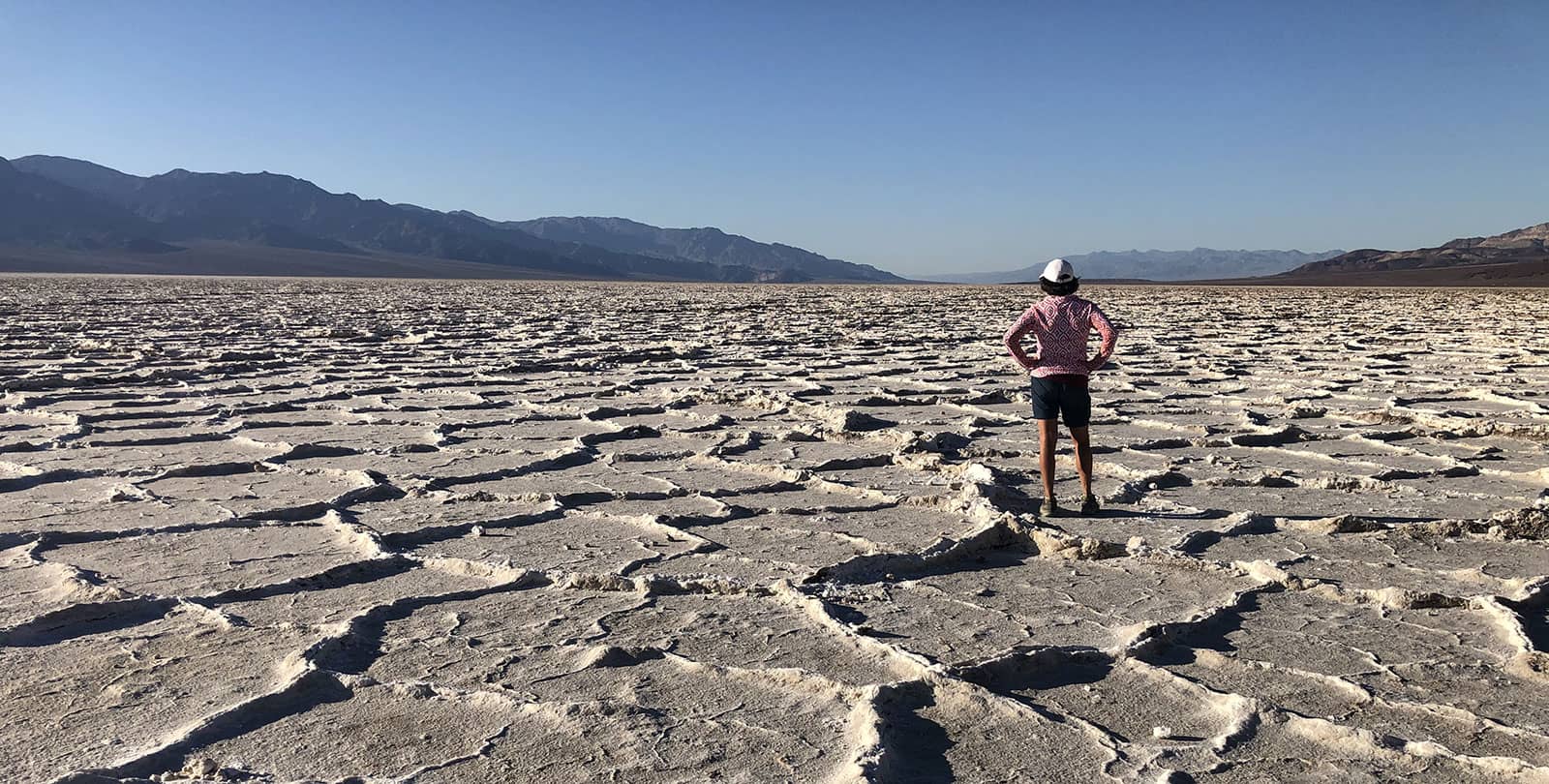
Photo credit: Gerry Feehan
Death Valley, California
Death Valley, California. Hotter than Hades.
Sans reservation, we arrived at Furnace Creek Campground, 268 feet below sea level. The park ranger informed us unequivocally that the campground was FULL. ‘You’ll have to turn around.’ Feigning a U-turn, I drove in – and immediately found a vacant, primo spot. I sauntered back to the entrance booth and slapped down my 22 bucks.
‘Gee, you were lucky,’ the ranger said. ‘Yup, lucky,’ said I. Coincidentally, precisely the same thing had occurred the night before at Stovepipe Wells campground, 30 miles up the road. And, ironically, it was the same lady whose instructions I had disregarded. Fortunately, I am a rather non-descript fellow and she didn’t thwart my advance. I wandered back to our site and set up the BBQ, although I probably could have fried the chicken directly on the searing pavement.
Late, after dinner, as the desert air began to cool, we heard a chewing noise outside the RV. Thinking it might deter intruding varmints, Florence instructed me to pee around the perimeter of the motorhome. A job I was up for. In the morning all was clear. No chewed hoses, flat tires or leaking parts. Feeling secure, we packed lunch and embarked on a stunning, strenuous hike to the summit of Wildrose Peak, 10,000 feet above the salty Death Valley floor. Late in the afternoon we returned, exhausted, to a camper full of… mouse turds.
Turns out our nocturnal intruder was not an external varmint, but one living amongst us. Before bedding down for the night, I set a trap under the sink. After midnight a loud ‘snap’ sounded. One dead mouse. I stepped out into the moonlight and discarded the stiffening carcass. And, my bladder being full, I gave the exterior one last precautionary piss.
The next night we attended an astronomy program outside the Furnace Creek visitor’s center. The topic was the speed of light. ‘For instance,’ the speaker explained, ‘it takes about 8 minutes for light to reach us from the sun. The nearest star is a couple of light years away. Our galaxy is over 100,000 light years across. And that,’ he said, pointing to a small fuzzy patch in the dark sky, ‘is Andromeda. The light you are seeing left that galaxy over 2,000,000 years ago.’ At this revelation, one family became visibly agitated – and abruptly left the group. As they departed I heard the matriarch exclaim, ‘2,000,000 years. Hasn’t he read the Bible?’
After the talk we stayed behind and shared our binoculars with a curious young couple from India. I pointed out some constellations as we chatted. He was a cardiologist, finishing his internship in Pittsburgh. The Indian government had funded a large portion of his education. I asked him if he intended to return to India after completion of his studies – or whether he might remain in the US to mine the riches of America’s fecund medical system.
‘Ah, this is the difficulty,’ he said. ‘Were I to stay, I shall certainly become rather wealthy. But if I return home, I can help a great many people. But there are also some drawbacks. In India the equipment is quite inferior. Also, oftentimes when a doctor operates and the outcome is poor, or perhaps the patient does not survive, the angry family beats the surgeon mercilessly.’ Then, looking up at the magnificent Milky Way and its billion myriad of stars shining onto a California desert, he said, ‘I shall have to ponder this.’
Out of the dark, a shaggy middle-aged American couple emerged. They introduced themselves as Chuck and Moonbeam. They had just completed their daily sun salutation. Chuck excitedly regaled us with his notion of the universe. ‘I’m an earth, moon, sun type of guy. But Moonbeam, she’s more outer planetary.’ I thought this description odd, given his wife’s moniker, but decided not to quibble over such minor galactic details.
‘Did you know the earth’s magnetic poles are reversing today?’ Moonbeam asked. I tried to explain that any wobble in the earth’s axis would take thousands of years and it would be difficult to note a reverse in polarity, even in a thousand lifetimes. Undeterred, she revealed excitedly, ‘Just this morning my daughter called to say she too felt the vibe.’
We returned to camp. I took out my ukulele. A 30-something fellow scooted by on his long board in the darkness. When he heard me playing, ‘Andrew’ stopped and asked us to join his group at their fire. We acquiesced. Andrew’s friend Nathaniel sat perched on a cahon, beating a deep primeval rhythm to the desert sky. Their female campmates, clad hippie-style in ponchos, danced and twirled, silhouetted by the flickering mesquite blaze.
I struck up a few tunes. After my rendition of Peaceful Easy Feeling, Nathaniel stood up, stepped behind an enormous eroding rock, and began to weep. After a few minutes, he re-joined us at the fire and approached me for a thankful hug. ‘Sorry, man, but that was so emotional. I haven’t cried like that in forever.’
When the evening ended, they all bid us adieu with hands clasped, a bow and a ‘blessings upon you.’ Andrew added, ‘May you have vivid, happy dreams all the night.’ Then we all enjoyed one last hug.
I stumbled back to the trailer, guzzled a beer, and promptly passed out.None of this is bullshit.
Gerry

Brett Bryan says
I want to go to death valley!!, twilight zone places are the best, perhaps you attract interesting people, anyhow thanks for that story.
Unknown says
Sounds like you can file this story under fact is stranger than fiction, dude.
Terry says
Sounds like the two of you had a hot time..
and another great story.. Thanks Gerry. Terry H
Unknown says
Great one!
You should publish!
no shit, have fun!